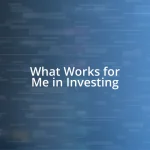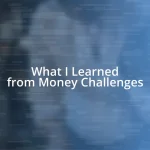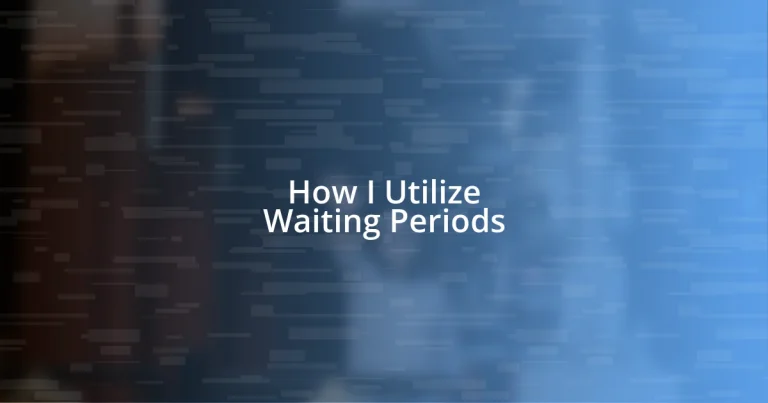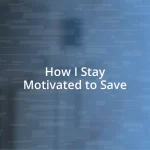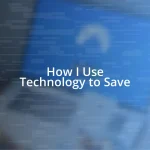Key takeaways:
- Waiting periods facilitate essential processes such as proper assessments, personal growth, and clarity through reflection and mindfulness.
- Benefits of waiting include skill development, reevaluation of priorities, and stimulation of creativity, often leading to better decisions and new ideas.
- Strategies for effective waiting involve setting micro-goals, practicing mindfulness, engaging with others, and tracking progress to transform waiting into productive experiences.
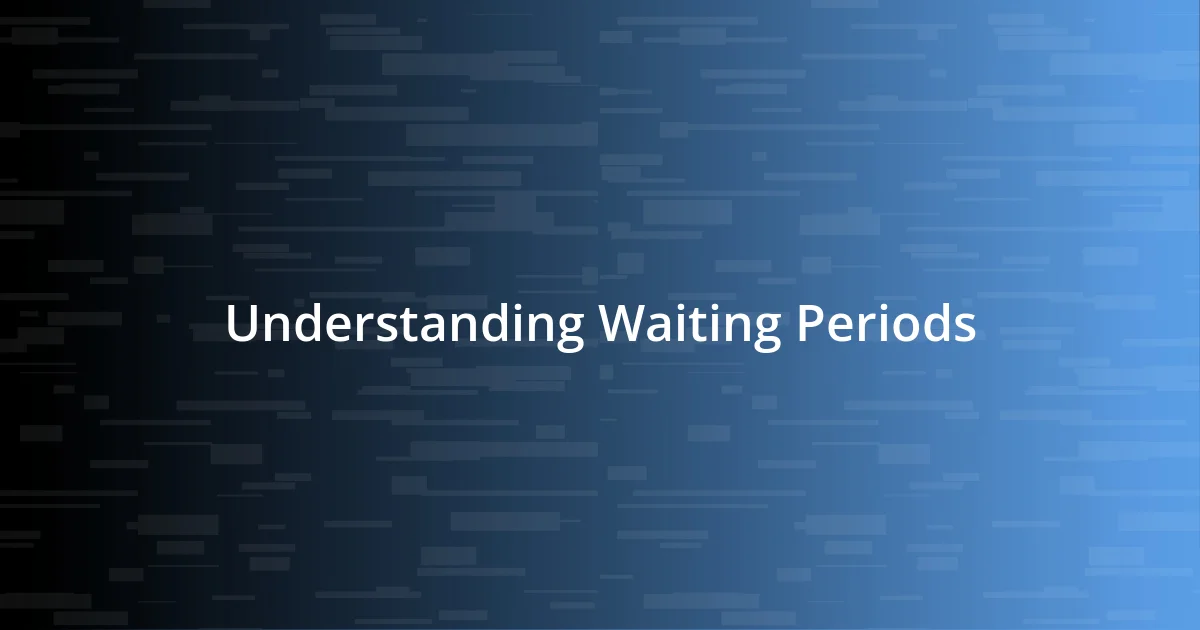
Understanding Waiting Periods
Waiting periods can sometimes feel like an eternity, can’t they? I remember when I had to wait for my home insurance claim to be processed. It was nerve-wracking, but understanding that waiting periods serve essential purposes made me more patient. They allow for proper assessments, prevent fraud, and ensure that claims are validated accurately.
I often find myself reflecting on how waiting periods can teach us valuable lessons about patience and resilience. When I was awaiting the results of a medical procedure, I felt a wave of anxiety wash over me. But, during that time, I discovered the importance of self-care and mindfulness. Instead of spiraling into worry, I focused on what I could control—reading a good book and meditating.
Ultimately, waiting periods aren’t just about the timeline; they represent a moment of transition. They encourage us to pause and evaluate what we truly want. Have you ever noticed how waiting can bring clarity? I’ve experienced it firsthand, realizing that the anticipation often leads to personal growth and deeper understanding.
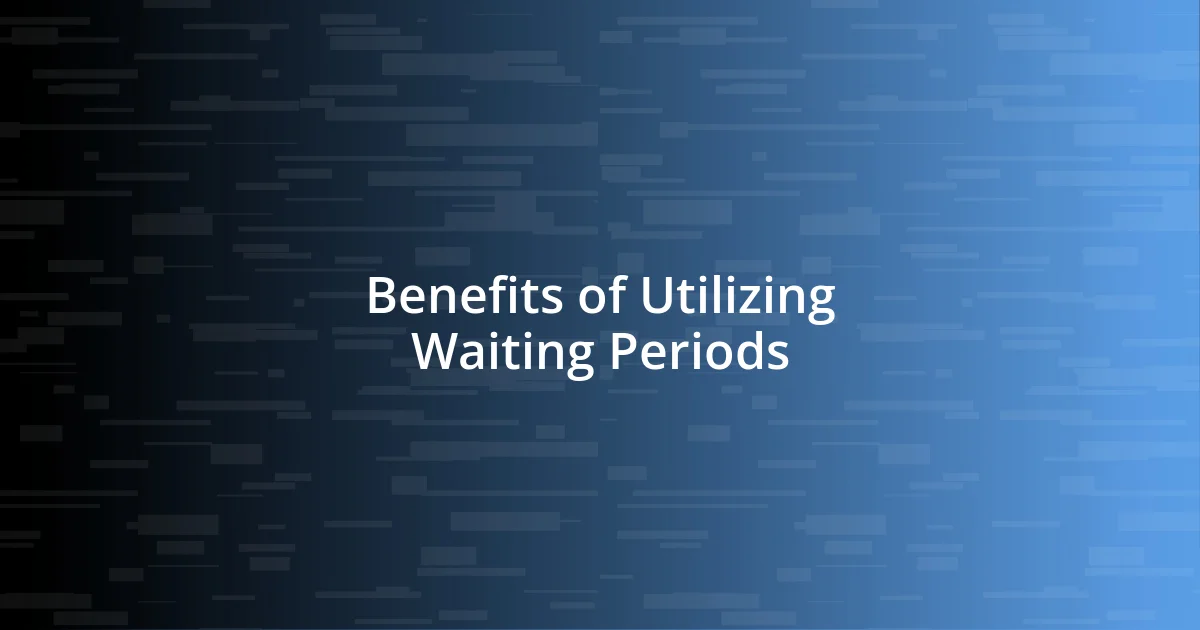
Benefits of Utilizing Waiting Periods
Waiting periods can foster a sense of anticipation that can be incredibly beneficial. I recall waiting for a big job interview; the opportunity filled me with excitement and nerves. During that time, I designed a plan to refine my skills, like practicing answers to common interview questions. This proactive approach not only calmed my nerves but also boosted my confidence, leading to a great result.
Additionally, these waiting periods act as a natural pause, allowing us to reevaluate priorities. I remember an instance when I made an impulsive investment, and the waiting period for it to finalize felt torturous. However, taking that time allowed me to reconsider my decision and seek out more informed advice, ultimately steering me away from a poor choice. It’s in those moments of waiting that I truly understood the value of patience.
Moreover, waiting periods provide room for creativity and reflection. While I was waiting to hear back from a publisher about my manuscript, I felt a surge of inspiration. Instead of succumbing to anxiety, I used the time to brainstorm ideas for my next project. This helped me realize that waiting doesn’t have to be stagnant; it can be a catalyst for new beginnings.
| Benefit | Personal Experience |
|---|---|
| Develops Skills | Practicing for a job interview made me more confident. |
| Encourages Reevaluation | Reflection during an investment’s waiting period saved me from a poor choice. |
| Stimulates Creativity | Waiting for feedback led to fresh ideas for my next project. |
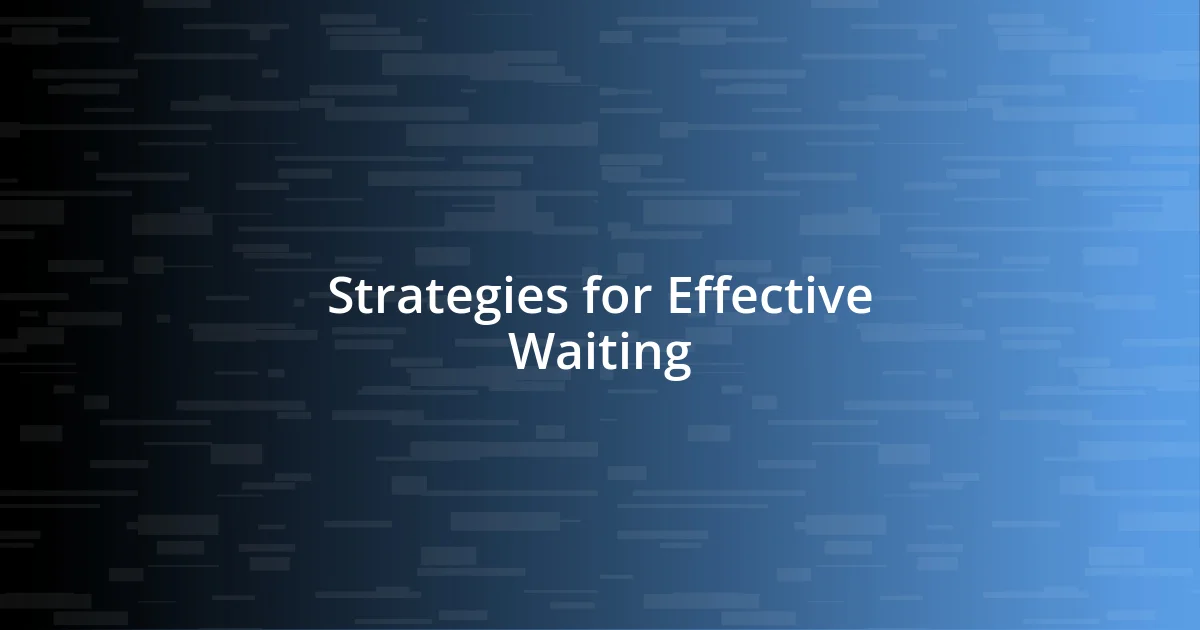
Strategies for Effective Waiting
When waiting, I’ve found that diversifying my activities can make the time feel more productive. For instance, during a lengthy wait for an approval on a loan, I started exploring new hobbies. I dived into painting and even began a small herb garden. Both not only kept me occupied but also provided unexpected joy and satisfaction, transforming what felt like dead time into a fulfilling experience.
Here are some strategies I’ve employed to make waiting periods more effective:
- Set Micro-Goals: Break the waiting period into smaller tasks. I often jot down things I can achieve while waiting, like reading a chapter of a book or organizing my workspace.
- Practice Mindfulness: I find that taking a few moments to breathe deeply and be present can truly lessen anxiety. It shifts my focus from the wait to the now.
- Connect with Others: Reaching out to friends or family during a waiting period has helped me maintain perspective. Conversations can lighten the mood and even result in new ideas or solutions.
By incorporating such strategies, I turn waiting from a frustrating experience into a time for personal growth and discovery.
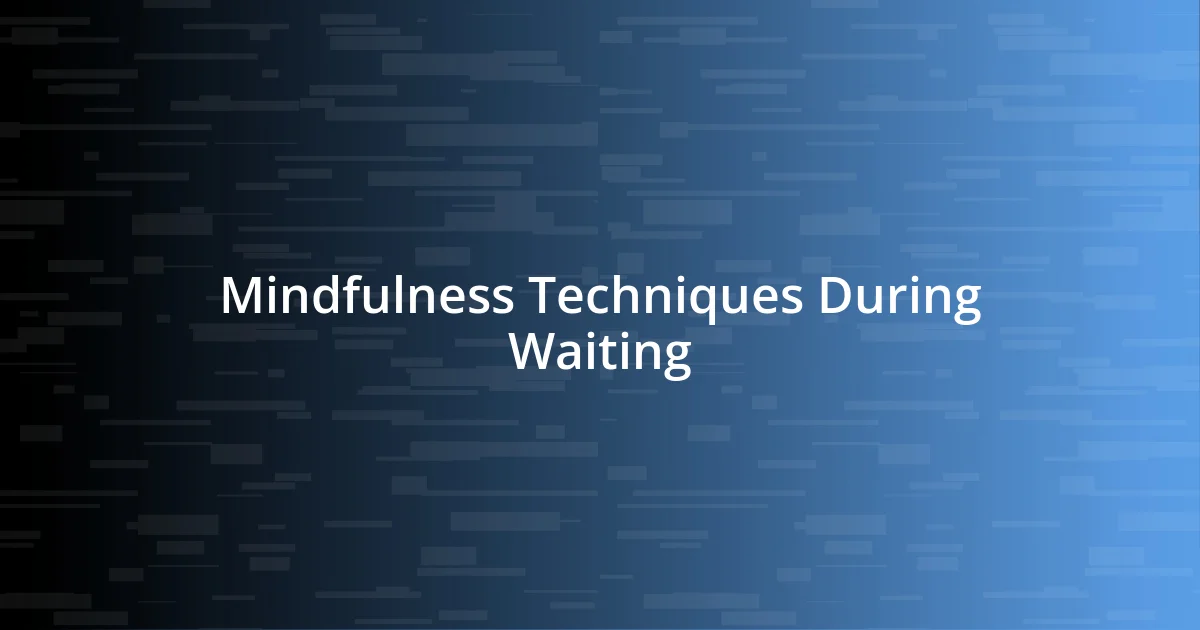
Mindfulness Techniques During Waiting
During waiting periods, I often turn to mindfulness techniques to anchor myself in the present moment. One particularly anxious time was when I awaited results from a medical test. Instead of spiraling into worry, I focused on my breathing—deep inhales and slow, purposeful exhales. This practice not only calmed my racing thoughts but also made me realize the importance of staying grounded, no matter the outcome.
Another technique I love is visualization. I have found that picturing a peaceful scene—like a quiet beach or a serene forest—can shift my mind away from the discomfort of waiting. During one long flight delay, I closed my eyes and imagined myself walking along that beach, feeling the cool breeze and hearing the waves. The vivid imagery allowed me to transform my frustration into a moment of tranquility, which made the delay feel less burdensome.
I also like to practice gratitude right in the midst of waiting. For example, when I was stuck in line for an event, I took a moment to appreciate the people around me and the experiences we were about to share. I asked myself, “What am I truly grateful for in this moment?” This quick mental exercise shifted my perspective and helped me connect with others, making the wait feel like a shared experience rather than a solitary struggle. How do you cultivate mindfulness during your waiting periods?
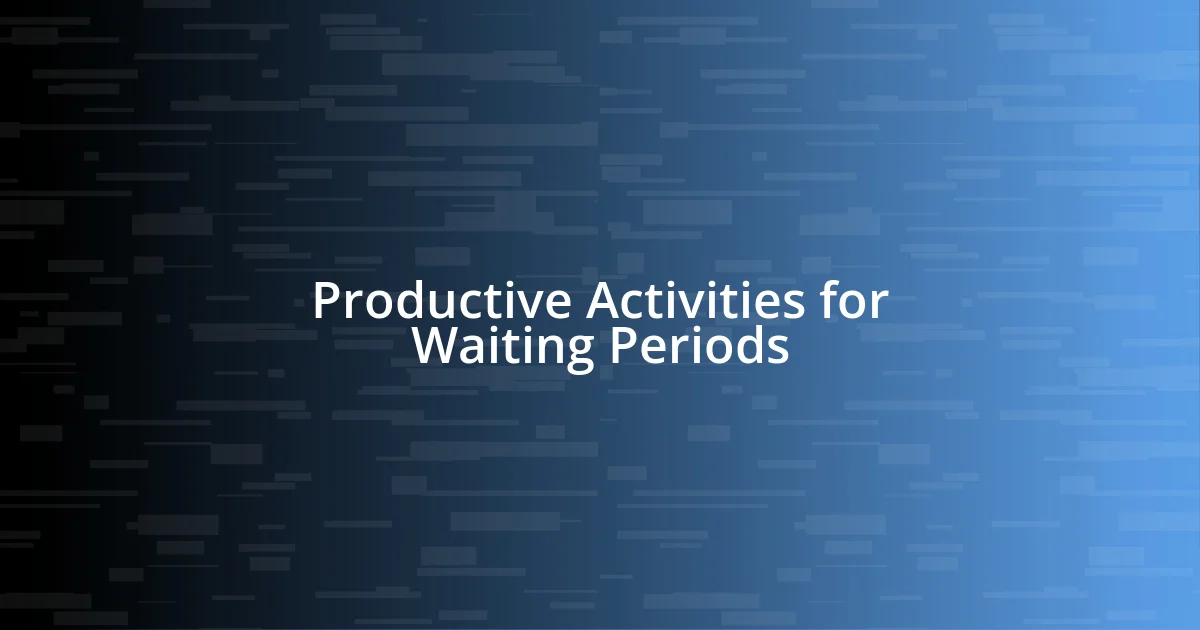
Productive Activities for Waiting Periods
While waiting, I often pull out my notebook to jot down thoughts and ideas that spring to mind. Recently, while waiting on a delayed flight, I started sketching a few concepts for a personal project I had put on hold. Surprisingly, those twenty minutes ended up being a spark of creativity; I found myself outside the waiting room, energized and excited by new possibilities. Have you ever considered how a simple act like writing can ignite inspiration?
Another activity I embrace is learning something new through podcasts or audiobooks. Just the other day, while sitting in a waiting room, I tuned into a podcast about emotional intelligence. It not only helped me pass the time but also provided me with practical tips I could apply in daily life. I couldn’t help but wonder, how many enriching experiences are waiting to unfold through the simple act of listening?
When I find myself in a waiting situation, I like to tackle small tasks that I might otherwise procrastinate on. For instance, during one wait for a meeting to start, I took the opportunity to declutter my digital files on my phone. It was a surprisingly therapeutic experience—a little productivity amidst the wait that brought me a sense of accomplishment. Don’t you find that minor tasks can often provide that much-needed sense of control in moments of uncertainty?
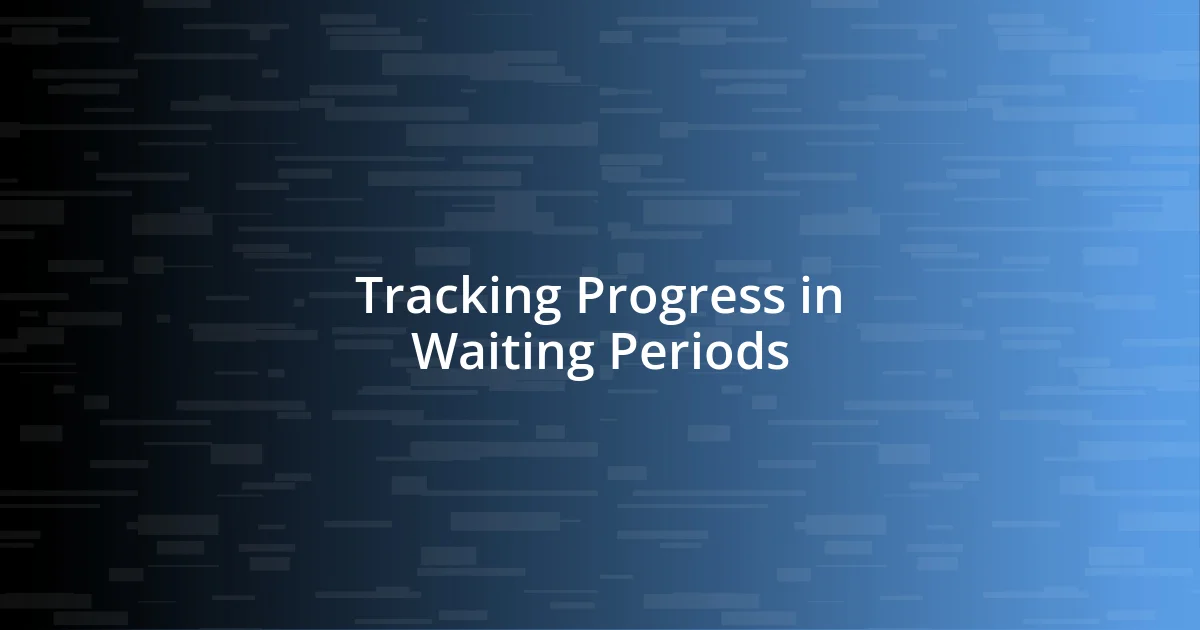
Tracking Progress in Waiting Periods
Tracking progress during waiting periods can be incredibly rewarding. I remember when I was once waiting for feedback on a job application. Instead of obsessively checking my email, I decided to create a checklist of skills I wanted to improve. This not only redirected my focus but also made me feel proactive, as I later realized how much I had learned about myself during that waiting time.
Another strategy I employ involves documenting my feelings throughout the wait. For example, I once kept a journal while waiting to hear back from a friend about a big life choice. Reading those entries later, I saw how my emotions ebbed and flowed, reflecting my journey. It was eye-opening to witness my own resilience, especially when I tapped into my inner dialogue during moments of doubt. How often do we take the time to express our feelings in such a raw way?
Additionally, I’ve found that setting small goals during these periods can be a game-changer. While once stuck in traffic, I decided to engage in self-reflection and set intentions for the week ahead. It helped me feel more grounded rather than frustrated by the delay. Isn’t it fascinating how a single moment of reflection can lead to clarity and motivation when we are in a pause?
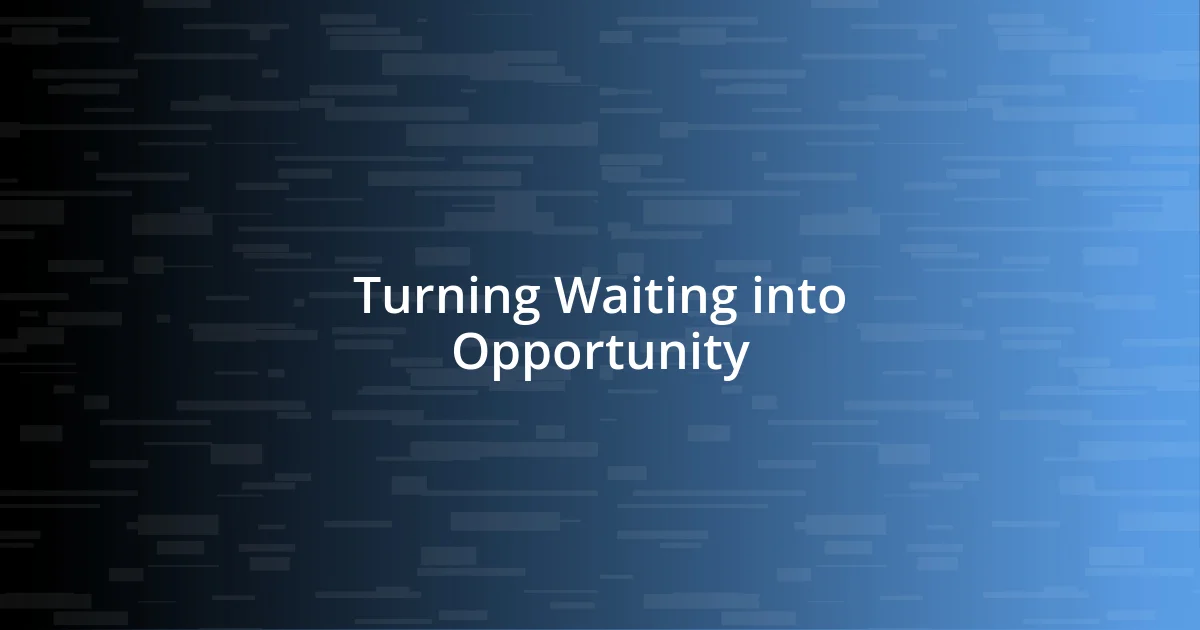
Turning Waiting into Opportunity
While I wait, I often find myself brainstorming new ideas. A few weeks ago, while waiting for my coffee, an idea popped into my mind for a community project. I quickly jotted down a few notes on my phone, and before I knew it, that brief moment of idleness turned into a plan that I couldn’t wait to share with others. Isn’t it incredible how fleeting moments can morph into impactful opportunities?
I’ve also discovered that waiting offers a unique chance to connect with others. Recently, I found myself seated next to someone in a doctor’s office, and instead of scrolling through my phone, I struck up a conversation. That unexpected dialogue not only filled the silence but also led to valuable insights and a few laughs. Have you ever noticed how a simple chat can transform your waiting experience into something meaningful?
Engaging in mindfulness during waiting moments can be incredibly refreshing. I recall a time when I was stuck in a long queue and decided to focus on my breathing. With each inhale and exhale, I felt my anxiety decrease and my mind clear. This practice not only allowed me to embrace the moment but also revealed how I often rush through life without appreciating what’s right in front of me. How often do we overlook the potential for peace amidst our busy lives?



